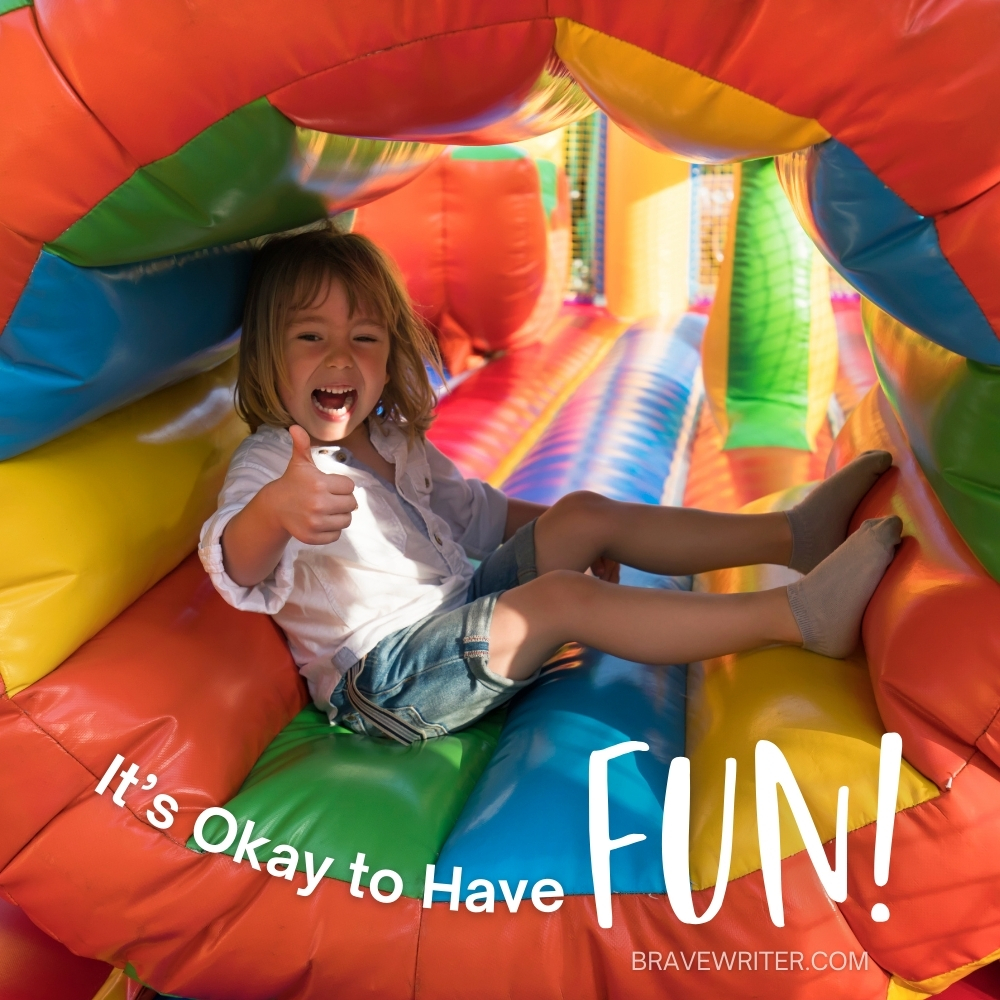It’s Okay to Have Fun

The number one email I get is the one that says the kids hate writing or school or handwriting or reading or phonics or spelling or…you get the idea.
What follows is a list of attempts to “get the child” to do the task that the child hates. Often the parent tries to modify the expectations first: one sentence, one page, for five minutes, just today, “let’s do it together”.
The second strategy is to punish or reward: No computer until you are done, or as soon as you finish we’ll have lunch.
The last resort is: pitch the program and buy another one, which leads to the original problem—the student hates the subject.
The alternative that works? Stop doing the thing the kid hates. Period. Just stop.
Focus instead on creating joy in the home, in the subject area. If spelling, handwriting, reading, grammar study, and punctuation are being met with anger, listlessness, sloppiness, frustration, tears, or “I hate school,” why would you keep pushing them? Stop doing what doesn’t work.
There are literally hundreds of ways to pick up handwriting, grammar, spelling, reading, and punctuation as you go, without a program or book to guide you. Grab your creativity and let loose!
Let me help.
For instance: a ten year old who is swinging his feet and not retaining the difference between verb and noun is not likely to get there with more bookwork enforced on his head and punishment threats.
But if you care about nouns and verbs (and I trust that you, full grown adult, know what they are—if not, learn; easy-peasy at 35 and 45), start noticing them in real life right now as you live in front of your kids.
The next billboard you drive by? Shout: “Find the verb! Find the noun! Shout the right ones, and you get a stick of gum.”
Do that for a while. Everywhere.
Write verbs on stickies notes in gel pens and put them all over the house. Stick them to everything and let your kids simply wake up to a house awash in verbs. Try it with nouns. Tell them it’s their turn to surprise you so you wake to a houseful the next morning.
Take a painting print and Xerox it. Ask your kids to circle every item in the painting that can be considered a noun. Now ask them what the central idea is in the painting. Write it at the top and circle it: Noun! (Such as, peace, war, love, hope, anger, etc.)
Handwriting a bore? Buy every conceivable writing tool, including pencils that need to be whittled with a pocket knife to get a tip, fountain pens, quills that require dipping the ink every time you use the pen, markers, gel pens and black paper, paint brushes. Use lemon juice as invisible ink and write that way.
My gosh! Who wouldn’t get tired of handwriting with the same old ballpoint every single day in the same old boring book? The world is filled with options. Use them!
Make your own paper with a paper making kit. Now see who wants to write! Buy cool new stationary or write on cardboard boxes or on the wall (We let all our kids write on their bedroom walls! They love it, their friends go wild over it, and I got to know lots of things about them as a result).
Write with a new font (get one of those books that shows you different ways to slope the letters) and copy that alphabet.
Or use a drawing book and learn how to draw! That requires the same level of dexterity and pencil comfort and leads to good handwriting incidentally.
For spelling: play games with spelling (the add-a-letter game, Quiddler, picking out words from this week’s dictation passage for each other – kid to kid, or kid trying to stump parent and then parent trying to stump kid).
Do all spelling tests (if you must) by text or instant message.
Honestly: why does learning have to be confined to programs and books and sitting at a table?
I hope some of these ideas catalyze your own. Post them below. Our families are so creative. Break out of your own boredom and the tedium of “enforcing school.” It’s okay to have fun while you learn! In fact, it’s the most likely way the learning will “stick.”


















For parts of speech another idea is Mad Libs. I actually taught my younger sister some of the parts of speech by writing Mad Libs for her and then explaining what nouns, verbs, adjectives, and adverbs are.
Love this! My son struggles with reading, so we take his reading book and snuggle up in his bed and have it be special time. He doesn’t want to write a journal or story, but he will write a list of his “surroundings,” which I delightedly told him is what great authors do – notice the details of the world around them. Now if I could just find some fun math ideas for my daughter ….